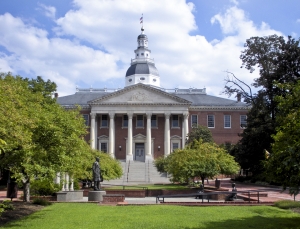 The 2013 legislative session officially came to an end last month, but 265 bills still awaited Governor O’Malley’s signature before they could make the transformation to state laws. The bills covered dozens of different fields of law including health care, environmental law, consumer regulations, education, and of course criminal law. The most notable bills that crossed the governor’s desk happened to be right up our alley in the field of criminal law, so naturally those are the bills we will discuss. The blog has followed the progress of state marijuana reformation for the past year, and it seems for there is now a small amount of closure on the topic. The signing of the medical marijuana bill closed the debate until next year’s session about how far Maryland was willing to move toward legalization. And to some up what this bill actually means for the state residents, it’s safe to say the law is a lot of bark and a little bite.
The 2013 legislative session officially came to an end last month, but 265 bills still awaited Governor O’Malley’s signature before they could make the transformation to state laws. The bills covered dozens of different fields of law including health care, environmental law, consumer regulations, education, and of course criminal law. The most notable bills that crossed the governor’s desk happened to be right up our alley in the field of criminal law, so naturally those are the bills we will discuss. The blog has followed the progress of state marijuana reformation for the past year, and it seems for there is now a small amount of closure on the topic. The signing of the medical marijuana bill closed the debate until next year’s session about how far Maryland was willing to move toward legalization. And to some up what this bill actually means for the state residents, it’s safe to say the law is a lot of bark and a little bite.
After all the lobbying and talk about decriminalization, the new Maryland marijuana law is realistically just a small step toward legally bringing the drug to those that need it. As discussed in previous posts, the law only allows academic hospitals to establish medical marijuana programs, and the official goal of these programs is research, as opposed to simply treating patients. The hospitals must publish their findings, as well as document the exact amount of resources expended to institute their programs. Your family physician will not be able to prescribe marijuana in the near future even if he or she works for one of these academic hospitals, as the programs likely won’t be fully functional until 2016. So how far has our state actually come in the movement to reform marijuana laws? Judging by the most recent legislative session it is safe to say baby steps at best.
Marijuana was not the only newsworthy topic coming out of Annapolis last week. O’Malley also signed a bill repealing the death penalty in Maryland. Defendants charged with first-degree murder and other capital offenses will no longer face the possibility of execution. Rather, capital punishment will be replaced by life in prison without the possibility of parole as the maximum sentence in state criminal cases. O’Malley has been lobbying for repeal of the death penalty since taking office, arguing that it is an ineffective and economically unsound crime deterrent. Capital punishment supporters, including the Baltimore County State’s Attorney, have expressed interest in bringing this issue to a vote in November. Upwards of fifty thousand signatures are required in order to successfully petition for this new law to be put to a vote.
Governor O’Malley also signed an anti cyberbullying bill into law last week. The law, which received a great deal of support from Baltimore Ravens running back, Ray Rice, makes it a crime to electronically harass a minor based on sex, race, or sexual orientation. The crime of cyberbullying will be a misdemeanor with a maximum 1 year jail sentence and a $500 fine. The blog will continue to monitor the implementation of each of these new laws, as all three are likely to show up in the headlines at some point during the near future.
Benjamin Herbst is a criminal defense lawyer serving all Maryland jurisdictions. Contact The Herbst Firm for a free consultation about your case.
Resources
O’Malley signs death penalty repeal, medical marijuana bill and other measures, washingtonpost.com.
 Criminal Defense Lawyer Blog
Criminal Defense Lawyer Blog

